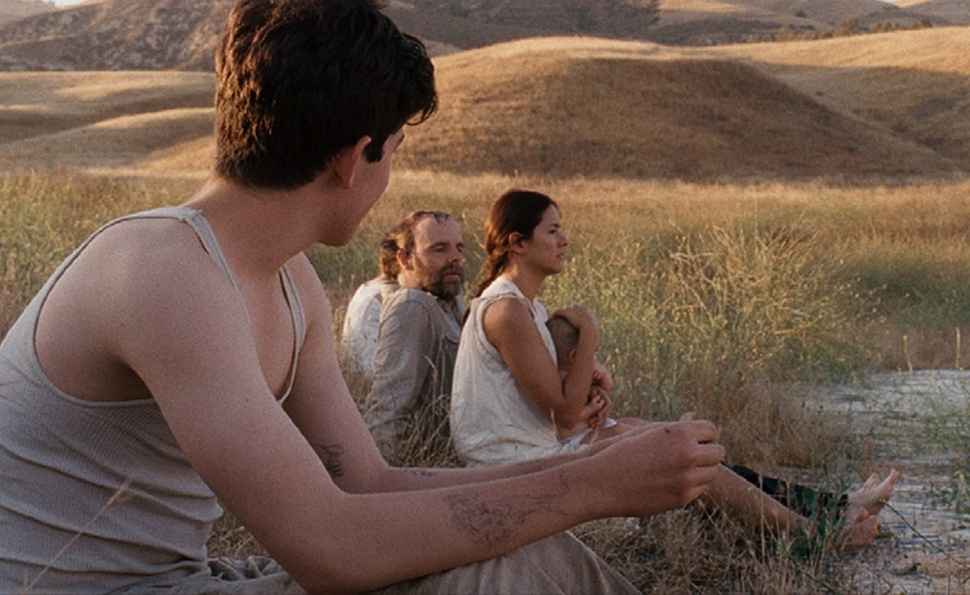Medeas, based loosely on Euripides’ Greek tragedy, is about a rural American family fraught with marital discord. The twist here is that Medea is the husband, not the wife, in a gender reversal that is inevitably more interesting on paper than it turns out to be on this particular screen.
Set some time during the 1980s, Medeas centers on a large farming family, with a typically stern, middle-aged patriarch Ennis (Brían F. O’Byrne) working hard—too hard—to provide for his ever-expanding brood. This includes his young, deaf-mute Latina wife Christina (Catalina Sandino Moreno), who has fallen out of love with him, and their five children, ranging in age from a toddler to the oldest son, Micah (Ian Nelson), who’s nearly a man. Micah is the default go-to guardian for the second-youngest boy, Jonas (Jake Vaughn), who occasionally climbs into Micah’s bed. Jacob (Maxim Knight), the curly-haired middle boy, is the regular troublemaker. His natural curiosity curses him with a heightened awareness of the tensions between his parents; this comes to a head when he catches his mother having sex with the local gas-station attendant. Ruth (Mary Mouser), the sole daughter, isn’t excluded from her father’s tyranny, and from an early age, she’s already learning to hide her burgeoning sexuality, sneaking away to change into more revealing clothing before pursuing a tryst with a neighboring boy.
The film begins innocently enough, with the family playfully bathing in a lake and a relaxed Ennis taking snapshots of his picture-perfect family. The subsequent click of the camera cuts the frame to black, followed by the title credits. This is a definitive formal separation between that one moment of bucolic bliss, and everything that is to follow.
Medeas consists of many small, innocuous scenes, most of which do little to propel the narrative forward. Instead, it uses a spectrum of body gestures to tell a larger story via the way his characters clean, play, eat, or simply existing, in a bored rural-living way. The details of that story are so basic and sparse—wife cheats on husband, he tries to figure out what to do about it, becomes strained by the pressures of providing for his thankless family, then finally exacts revenge—that Italian director Andrea Pallaoro counteracts the narrative minimalism by simply letting it be, instead focusing on the small quotidian details. These include scenes of the kids bathing and splashing water on each other. Scenes of the family glued to their new television set. Scenes of the dinner table, where manners are heavily enforced by the no-bullshit patriarch. Scenes of the parents individually taking care of the baby, lovingly holding him, gently playing with his tiny features. Scenes of the kids exploring their endless playground, trekking through dust and forest.
Much of this activity is silent, as if deaf-mute Christina has cancelled out the others’ desire to speak verbally. It’s an unusual slice of one family’s life, because that kind of quiet shared existence is recognizable even to the most garrulous bunch. The dialogue is so minimal, it also underscores the family’s inability to talk about what is happening to them.
In the beginning, this idleness is captivating. The immaculately framed 35mm imagery will understandably be compared to Terrence Malick, though Pallaoro is carving out his own unique aesthetic here, too. What doesn’t work for Medeas is embedded in its source material. No matter how hard the film tries to work against the grain of that tragedy, it must adhere to it on some fundamental level. With a foregone conclusion in place, small gestures start to seem ridiculous, even bordering on melodramatic in their microscopic form. One scene in which Christina trims her pubic hair is closely followed by another with the increasingly haggard Ennis finding her hair in the bathroom trash can, thumbing them as bewilderment turns to rage. The grafting of Greek tragedy to Malickian detail isn’t naturalistic or authentic, it’s absurd, and repeated to tiresome effect throughout the film. WhatMedeas sorely lacks is the simmering tension of films like Neighboring Sounds or Repulsion, which find the right tone to match the subject matter. Medeas ultimately proves that the formal signifiers of slow-moving arthouse cinema—narrative subtlety, impeccable imagery—aren’t the only elements necessary to make a solid film, especially one that’s trying to reboot a classic story.

